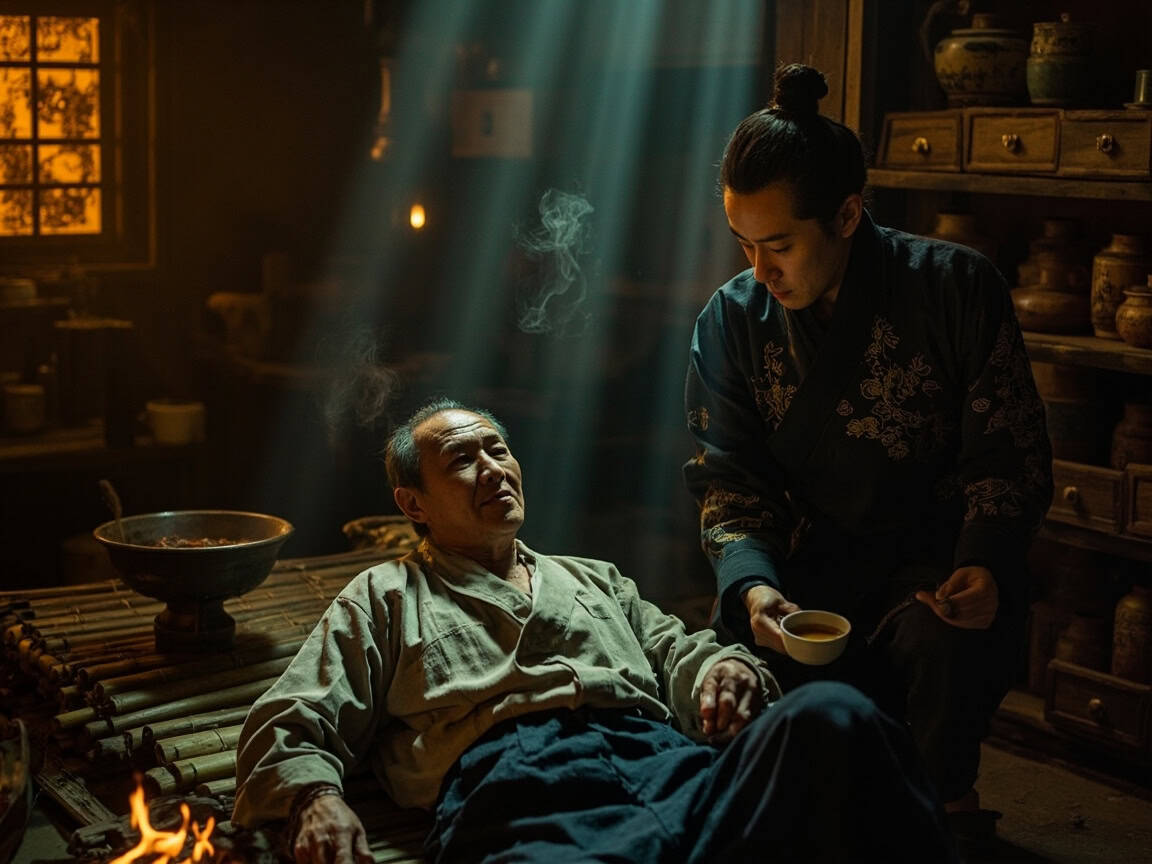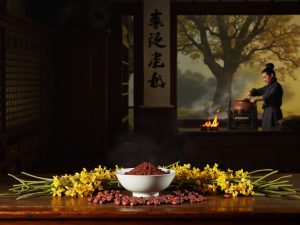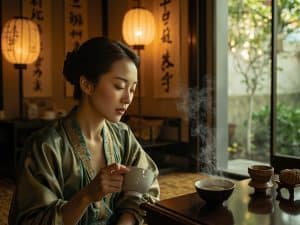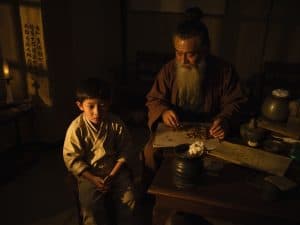Table of Contents
ToggleTraditional Chinese Medicine Case Analysis 7: Constipation, Fever, “Hand Picking at Clothes”
Author: Gu Yuxi Editor: Gu Yuxi Translator: Gu Yuxi
Traditional Chinese Medicine Medical Case from “Treatise on Cold Damage in Ninety Discourses” by Xu Shuwei, Song Dynasty Case 86: Empty-Hand Grasping Syndrome
Original Text:
A certain vendor, Mr. Zhang, about 40 years old, contracted cold damage disease. He had difficulty with bowel movements, developed fever in the late afternoon, and exhibited hand picking at clothes, empty-hand grasping, and fixed, urgent gaze. He had consulted three doctors, all of whom declared it a most malignant symptom of cold damage, untreatable. Later, I was summoned. I reluctantly went to examine him. I said, “This is indeed a serious sign. Nine out of ten who contract this die. Although Zhongjing mentions this syndrome, he provides no treatment method, only stating, ‘Those with a wiry pulse live, those with a rough pulse die.’ Moreover, the patient has already undergone emesis and purgation, making medication difficult. I’ll just give him some medicine. If his bowel movements become smooth and his pulse remains strong, perhaps he can be managed.” So, I prescribed Xiao Chengqi Tang (Minor Qi-Regulating Decoction). After one dose, his bowel movements became smooth, and his other symptoms gradually subsided. His pulse was slightly wiry, and he recovered after half a month.
Xu Shuwei’s Commentary:
Someone asked, “Why do those whose pulse becomes wiry after purgation live?” I replied, “The Jinkui Yuhan Jing (Golden Cabinet and Jade Casket Classic) states: ‘Picking at clothes and grasping at the bed, aimless grasping, restlessness and anxiety, slight wheezing, fixed gaze, a wiry pulse indicates survival, a rough pulse indicates death. For those with a faint pulse, if there is only fever and delirium, Chengqi Tang can be given.’ I have observed Qian Zhongyang’s pediatric methods, where picking at clothing and aimlessly grasping objects indicates liver heat. This syndrome is listed in the Yangming chapter of the Yuhan Jing. Yangming refers to the stomach. If there is pathogenic heat in the liver, it invades the stomach meridian. Therefore, Chengqi Tang is used to purge the liver, and if a strong pulse is obtained, it indicates peace and harmony, and that the stomach is firm and unaffected. This is the reason for survival.” I once said that those who study Zhongjing’s treatises without understanding other medical texts to uncover the hidden profundities, and who specialize in only one classic, will not achieve proficiency. One must study ancient and modern medical texts to elucidate Zhongjing’s unspoken meanings.
Translation:
A vendor named Zhang, around 40 years old, fell ill. He had difficulty with bowel movements, developed a fever in the afternoon, exhibited hand picking at his clothes, and empty-hand grasping, with his eyes fixed straight ahead. He had seen three doctors, all of whom said the patient had the most dangerous disease and couldn’t be cured.
Then I was summoned. I reluctantly went, and after diagnosing, I said, “This is indeed a very dangerous illness. Nine out of ten people who get it die. Although Zhongjing mentioned this illness, he didn’t provide a treatment method, only saying, ‘Those with a wiry pulse live, those with a rough pulse die.’ Moreover, the patient had been mistakenly purged by incompetent doctors, making it very difficult to use medication. I’ll give him a prescription; if the patient can have a bowel movement after drinking it, and his pulse is still strong, there’s still a chance for recovery.”
So, I prescribed Xiao Chengqi Tang. After one dose, the patient’s bowel movements became smooth, and other symptoms gradually subsided. His pulse was still slightly wiry, and he recovered half a month later.
Xu Shuwei’s Commentary:
Someone asked, “Why do those whose pulse is wiry after purgation live?”
I replied, “The Jinkui Yuhan Jing says: ‘picking at clothes and grasping at the bed, aimless grasping, restlessness and anxiety, slight wheezing, fixed gaze, a wiry pulse indicates survival, a rough pulse indicates death. For those with a faint pulse, if there is only fever and delirium, Chengqi Tang can be given.’ I once observed Qian Zhongyang’s pediatric methods, where picking at clothing and aimlessly grasping objects indicates liver heat. This syndrome is listed in the Yangming disease chapter of the Yuhan Jing. Yangming refers to the stomach. If there is excessive pathogenic heat in the liver, it spreads to the stomach meridian. Therefore, Xiao Chengqi Tang is used to purge the liver, and if a strong pulse is obtained afterward, the prognosis is peaceful and harmonious, indicating that the stomach is not affected by the evil. This is the reason for survival.”
I once said that studying Zhongjing’s works without understanding other medical texts to uncover the hidden profundities behind the passages, and those who only specialize in one classic, will not achieve true proficiency. One must read ancient and modern formulaic texts to uncover Zhongjing’s unwritten meanings.
【Traditional Chinese Medicine Syndrome Differentiation Approach】:
Differentiating the Six Diseases:
- Urination difficulty/facilitation: None.
- Taiyang disease: None.
- Yangming disease: Yes. “Cold damage disease,” “difficulty with bowel movements,” “fever in the late afternoon,” “hand picking at clothes,” “empty-hand grasping,” “fixed, urgent gaze.”
- Shaoyang disease: None.
- Shaoyin disease: None.
- Taiyin disease: None.
- Jueyin disease: None.
Differentiating Miscellaneous Diseases:
- Qi deficiency: None.
- Blood deficiency: Possible. There are signs of dried up yin fluid – hand picking at clothes, empty-hand grasping, fixed, urgent gaze.
- Water retention: None.
- Stagnant food: Yes. “Difficulty with bowel movements.”
- Phlegm obstruction: None.
- Blood stasis: None.
- Other miscellaneous diseases: None.
Summary:
This is actually a standard Yangming disease with stagnant food, which definitely requires a purgation method. The original medical case used Xiao Chengqi Tang. If it were me, I would use Da Chengqi Tang (Major Qi-Regulating Decoction) in this situation, needing an urgent purgation to preserve yin. In the original text, Xu Shuwei’s theoretical basis is: “The Jinkui Yuhan Jing states: ‘Picking at clothes and grasping at the bed, aimless grasping, restlessness and anxiety, slight wheezing, fixed gaze, a wiry pulse indicates survival, a rough pulse indicates death. For those with a faint pulse, if there is only fever and delirium, Chengqi Tang can be given.'”
However, in the Guilin Ancient Edition of “Treatise on Cold Damage and Miscellaneous Diseases”, there’s an identical clause: [9.35] “For cold damage, if after emesis or purgation, the disease is not resolved, and there is no bowel movement for five or six days, or even more than ten days, with tidal fever in the late afternoon, no aversion to cold, and muttering as if seeing ghosts; if severe, the patient does not recognize people, picks at clothes and grasps at the bed, is agitated and restless, has slight wheezing, and a fixed gaze; a wiry pulse indicates survival, a rough pulse indicates death; if the pulse is faint, and there is only fever and delirium, Da Chengqi Tang is the main treatment.” The annotation states that Da Chengqi Tang is the main treatment.
The Shanghan Zabing Lun passage corresponding to this Traditional Chinese Medicine case:
Differentiating Pulse-Syndromes and Treatment of Yangming Disease 9.35 — [9.35] “For cold damage, if after emesis or purgation, the disease is not resolved, and there is no bowel movement for five or six days, or even more than ten days, with tidal fever in the late afternoon, no aversion to cold, and muttering as if seeing ghosts; if severe, the patient does not recognize people, picks at clothes and grasps at the bed, is agitated and restless, has slight wheezing, and a fixed gaze; a wiry pulse indicates survival, a rough pulse indicates death; if the pulse is faint, and there is only fever and delirium, Da Chengqi Tang is the main treatment.”
Hu Xishu’s Interpretation of this Clause:
When Taiyang cold damage should be treated by sweating according to the law, if emesis or purgation are used, it’s a complete misdiagnosis. On one hand, it depletes body fluids, and on the other, it weakens the interior, causing the external evil to sink inward, leading to Yangming disease.
“Tired and restless” refers to unprovoked fright and unrest.
If the patient hasn’t reached the point of fullness and dyspnea, only slight wheezing, then the disease is already quite severe. Fixed gaze and slight wheezing indicate that the qi is about to escape upwards but hasn’t yet, so it’s not at the point of death. At this time, one must observe the pulse. “A wiry pulse indicates survival“; wiry means there’s excess in the pulse, and wiry is relative to weak. A wiry pulse indicates that the body still has resistance and is not completely deficient; Da Chengqi Tang can still be used for a last stand. “A rough pulse indicates death“; rough means extreme deficiency, a sign of depleted blood. In such a case, the medicine cannot be tolerated; the patient will die if Da Chengqi Tang is administered, and will also die if it’s not. They simply can’t tolerate the medicine. If they don’t take Da Chengqi Tang, the disease won’t be cured. So, death is inevitable.
“Only fever and delirium” refers back to the section before “muttering as if seeing ghosts” (no bowel movement for five or six days, or even more than ten days, tidal fever in the late afternoon, no aversion to cold). If there’s only fever and delirium, for a milder case, just like the “tidal fever in the late afternoon, no aversion to cold, muttering as if seeing ghosts” described above, it’s not serious, and taking Da Chengqi Tang for purgation will cure it.
The meaning of this passage is that while caution is necessary, you must also be bold when it’s time to attack. So, a doctor must be meticulous and cautious, but also courageous; you must attack when necessary. If a patient reaches the point of “picking at clothes and grasping at the bed, agitated and restless, slight wheezing, and fixed gaze,” they’ve been completely delayed. This delay isn’t necessarily caused by one doctor. When encountering such febrile diseases, ten out of nine times, the bad habit in our TCM community is to assume any fever indicates yin deficiency, leading to prescriptions like Liuwei Dihuang Wan (Six-Ingredient Rehmannia Pill), which harms people. If delirium is seen, it’s said to be a disturbance of the spirit, and then “Jufang,” “Zhibao,” or “Angong Niuhuang” are prescribed, considered core skills, and then there’s no solution.
In fact, the disease syndrome in this clause is due to internal excess. The prescriptions given by these bad habits are all ineffective and harmful. I might be speaking a bit harshly, but I have indeed seen many doctors mislead people this way. Zhongjing’s passage here means not to delay to this extent. Of course, there are also cases of misdiagnosis, which are the most severe. Yangming disease itself consumes body fluids, and in this case, due to mistaken emesis and purgation, the treatment fundamentally harms body fluids while also drawing the external evil inward, leading to a severe onset of Yangming disease. Therefore, I believe these several lengthy paragraphs are entirely for doctors to read, as many people are harmed by such bad treatments.
Every dose of Da Chengqi Tang is like this: “If one dose causes a bowel movement, stop subsequent doses.” Strong purgative medicines are not used continuously. The ancients also said, “recovery after one cup!” As long as the medicine is used appropriately, there will be no failure. Moreover, this medicine (Da Chengqi Tang and other strong purgatives) is not used continuously.
Formula: Xiao Chengqi Tang (Minor Qi-Regulating Decoction)
Source: “Treatise on Cold Damage and Miscellaneous Diseases”
Ingredients:
- Da Huang (Rhubarb) 120g (washed with wine)
- Hou Po (Magnolia Bark) 60g (baked, peeled)
- Zhi Shi (Immature Bitter Orange) 3 large pieces (baked)
Preparation: Simmer the above three ingredients in 4 sheng (liters) of water until 1 sheng and 2 ge (about 1.2 liters) remain. Remove the dregs, divide into two warm doses. The first dose should induce a bowel movement; if not, drink the entire remaining portion. If a bowel movement occurs, do not take the second dose.
Hu Xishu’s Dosage:
- Wine-washed Da Huang: 12g
- Hou Po: 6g
- Zhi Shi: 6g
Hu Xishu’s Formula-Syndrome Indications:
Xiao Chengqi Tang does not contain Glauber’s salt (Mang Xiao). It is very strong in promoting bowel movements and reducing bloating.
Xiao Chengqi Tang has a stronger purgative effect than Tiao Wei Chengqi Tang (Qi-Regulating and Stomach-Harmonizing Decoction) because it does not contain licorice.
Xiao Chengqi Tang primarily targets bloating and distention, with Da Huang, Zhi Shi, and Hou Po combined. The anti-bloating power of Xiao Chengqi Tang is still stronger than Tiao Wei Chengqi Tang.
However, its heat-clearing power is weaker because it lacks Glauber’s salt.
If the “stomach qi repletion” (wei jia shi) is only about repletion, fullness, and bloating, without tidal fever, Xiao Chengqi Tang alone is sufficient. If there is tidal fever, Glauber’s salt is essential.
Disclaimer:
The experiences and insights shared above represent the author’s personal usage and understanding, and are provided for reference only as part of academic exchange. Please do not blindly replicate or apply them; any consequences arising from such actions are solely your responsibility. As individual constitutions vary, medication should be tailored accordingly. It is advisable to use such treatments under the guidance of a qualified physician. If you have additional experiences to share, comments and submissions are welcome.
If you appreciate my article, please give it a like.
If you are a generous and affluent individual, please consider making a donation!
Your recognition is my greatest motivation to continue writing—thank you very much!
USD Donation Button —
A RMB donation button is available below.
 微信赞赏
微信赞赏 支付宝赞赏
支付宝赞赏




